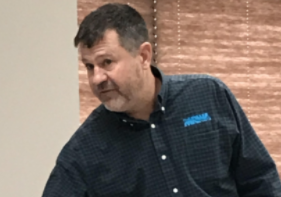Local leaders met April 20 with water source experts to discuss the soil and water conservation possibilities in the Mozingo Lake 13,000 acre watershed.
Nodaway County Commissioners hosted a demonstration of soil conservation practices by Missouri Rural Water Association Source Water Specialist Eric Fuchs, along with two NRCS representatives, who also spoke to Nodaway County Economic Development Director Josh McKim and Maryville Chamber of Commerce Executive Director Lily White.
The reason for the meeting and discussion was the reality of Mozingo Lake waters supplying over 30,000 households with safe, reliable drinking water that has had a history for several years of bad odor and taste. The City of Maryville, which is the seller and processor of the water has tried multiple processes to stop the toxic algae bloom, adding up to nearly a million dollars, to alleviate the issue of taste and smell. The city leaders, who were not present at the April 20 demonstration and discussion in the county’s Administration Center, have been active with the state entities and the landowners whose land is in the watershed for the lake. There are several state and federal agriculture programs, including EQIP, that would aid in a cost share for a variety of soil conservation programs.
Other monies have been secured from federal soil and water, $200,000; state NCRS, $250,000 and local NRCS, $200,000; plus EPA, Missouri Department of Conservation and several other federal and state agencies who have provided assistance to the city and the landowners.
There have been four meetings since January 2020 with the farmers who could be practicing good soil and water conservation with the help of these programs and monies. The proper percolation through the soil would have several benefits to the farmer’s net revenue, the silting of the lake and the additional nutrients of nitrogen and phosphorus leaching into the lake. Toxic algae bloom is more prolific with the silting of the lake that causes the lake to have less water making the water to heat up quicker in the spring and stay warm with the bright sunshine and the additional nutrients allows for more growth.
The watershed of 13,000 acres equals 2,000 owned by the city, which is also needing soil conservation practices, 1,000 acres in CRP and the 8,000 acres of row crop and grazing fields, some owned by absentee owners, complicating the communication process.
The examples that were provided spoke to water, including a two-inch rainfall and run-off, percolations through the soil with diverse ground cover. It was obvious from the demonstration that ground cover in grassy areas or also non-production cover-crops for no-till row crop acres allowed for a clearer water in less amounts to continue into the lake. Over-grazing pastures also created a detriment as bare soil welcomed weeds and would allow for more waters to run off quickly causing erosion, silting, to occur. The presenters advised rotation of grazing areas into paddocks of no more than 60 days, allowing the good grasses to recover.
Fuchs also spoke about a possible horror-story future of the lake’s water not being usable to drink if the toxic algae bloom advances to a critical point and the in-the-water uses of the lake such as boating, swimming and fishing would also be in jeopardy. The Maryville’s sale to the town’s residences and also to Public Water Supply of Nodaway County Number One for much of the rest of the county’s homes for drinking purposes and up to $15 million economic impact per year the recreational value of Mozingo Lake would be monumental.
With the soil conservation practices espoused by the soil and water experts not being traditional to most land uses; they are cost effective even without these early dollars attained with government and the results to the bottom line for the farmer as well as the improvement to the drinking water are positive quickly.
Fuchs noted the nitrates can be eliminated within two years. Wildlife will also benefit from the practices. Timber would also be helpful for the soil silting issue.
Finally, the water experts in speaking to the commissioners and leaders, requested the entities to pen letters of support to be sent to federal elected officeholders. They are also asking letters from Nodaway County Farm Bureau, NCCA and corn and soybean grower associations. Nodaway County Commissioners are also studying the possibility of applying for a Missouri Department of Natural Resources’ “319 grant,” adding another $400,000 to the total for the NCRS match.





Facebook Comments